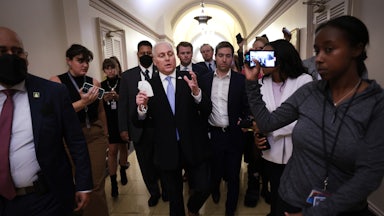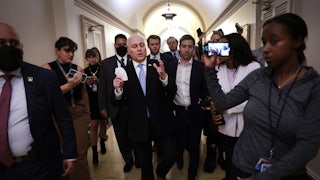The House of Representatives will hold a vote on Tuesday to elect the next speaker, exactly two weeks after former Speaker Kevin McCarthy was unceremoniously booted from that post by a cadre of hard-right Republicans in his own conference, along with every Democratic representative. The latest GOP nominee for speaker, Representative Jim Jordan—a conservative firebrand once infamous for antagonizing party leadership—has spent the days before the vote locking down support from the other members of his caucus. By Monday, several Republican holdouts announced their support for Jordan, indicating that he’d made considerable progress assembling the needed majority of members.
But even if every Republican votes to elect Jordan speaker on Tuesday, it remains to be seen whether the House as an institution has been permanently altered by the weeks of political chaos. In the immediate term, there are pressing concerns to which the House will immediately return, including ensuring that the basic functioning of government continues apace.
It was over this hurdle that McCarthy stumbled. Congress narrowly averted a government shutdown at the end of September, passing a six-week stopgap measure to keep the government running, but it’s unclear how another such crisis can be avoided next month. House Republicans had hoped to pass the necessary 12 appropriations bills before mid-November, rather than pass another continuing resolution to keep the government funded temporarily, but there has been no progress on approving those measures—all of which would be dead on arrival in the Democratic-controlled Senate anyway.
“Whoever the next speaker is—and it’s looking more and more like it’s gonna be Jordan—will have to deal with the funding issue immediately,” a House Republican aide told me. Another question mark is whether Congress can provide aid to Israel promptly, which has bipartisan support. “The conference is pretty unified on Israel, so that’s a bill that’ll be ready to go as soon as we have a speaker. Funding the government won’t be so easy to find a consensus,” the aide continued.
Michael Thorning, director of structural democracy at the Bipartisan Policy Center, argued that a government shutdown would do more to shake public confidence in Congress than its current speakerless state of existence. It could also harm international trust in the United States if Congress is unable to approve additional aid for Ukraine or send support to Israel, both of which are priorities for the Biden administration.
“If we go on [without a speaker for] a month, and no additional support for Israel has been provided and it becomes much clearer that that is tied up in a dysfunctional Congress, then I think it’s possible that the international community starts to reconsider what America’s future role in the world will be,” Thorning said.
If resolved this week, however, Thorning predicted that the situation in the House would not immediately dampen the public’s already cracked faith in Congress as an institution. “I think in the long run, this will be a very short and forgotten chapter in most people’s minds of how Congress does or does not function,” Thorning said. “Most people do not follow politics enough that this is a concern for them.”
If there is a lasting change wrought by the interregnum, it could involve reform to House rules. Under a rule established after the September 11 terrorist attacks, an acting speaker pro tempore is chosen to ensure continuity if a speaker needs to be replaced midway through the congressional term. Members on both sides of the aisle have largely concluded that this position is primarily ministerial, its greatest function to preside over the vote to choose the next speaker.
But if Jordan’s bid founders on Tuesday, creating further delays in selecting a speaker, representatives will need to think about empowering the current Acting Speaker Pro Tempore Patrick McHenry in order to ensure the smooth functioning of government. Should the sun set on Tuesday with a newly minted Speaker Jordan, there’s a real possibility that situation would prompt a rule change to redefine the pro tempore role.
“It’s fine to have a ministerial speaker program. But if there’s a true emergency at the Capitol, I think the House would be much better served to have a much more empowered speaker pro tem,” argued Matthew Glassman, a senior fellow at the Government Affairs Institute at Georgetown University. “I don’t think it makes any sense to have this pseudo-emergency provision that essentially doesn’t do you any better than putting the clerk in the chair.”
The House’s leadership crisis may also convince future speakers to change the rules on how many members must sign on to trigger the so-called “motion to vacate,” the procedural maneuver that ultimately resulted in McCarthy’s ouster. In order to obtain the necessary votes to become speaker in January, McCarthy appeased the hard-line faction of the GOP conference with several concessions, including one that would permit just one member to trigger a vote of no confidence in the speaker. This allowed Representative Matt Gaetz to call for a vote on the motion to vacate. McCarthy could then only lose four Republican votes to remain speaker; eight GOP representatives voted against him. All Democrats voted to oust McCarthy as well, their hands forced by the motion to vacate.
The purpose of the motion to vacate is to eject a speaker who no longer controls the majority, allowing a new majority to wrest that power, said Glassman. But there was no alternative speaker waiting in the wings to step in once McCarthy was removed; Minority Leader Hakeem Jeffries has the support of all Democrats, but that is only a plurality of the House. Glassman suggested replacing the motion to vacate with another procedure, such as a discharge petition, which would require 218 signatures to call for a vote.
“That would allow a different majority that forms when there’s no majority and speaker anymore to take the speakership. But it wouldn’t allow eight people to force this on the minority party,” Glassman said. “That sort of reform … might be in the interest of any majority party that doesn’t want a small faction of their party being able to force these sorts of issues just by hijacking the minority’s need to participate.”
It’s still unclear whether the ousting of a speaker for purely political reasons will become a regular occurrence. That depends not only on whether the House changes the rules on the motion to vacate, but also on the size of a party’s majority. Perhaps the most significant lesson—especially for the Republican Party, which has members increasingly willing to challenge party leadership to extreme ends—is that any future speaker must be ready to contend with a tenuous grip on power.
“If there is another short-lived majority in the next 14 months, the House will really have to reckon with its own rules and procedures,” said Thorning. “I think everyone should be expecting that we have very small majorities and competitive [speaker] elections in the near future.”










